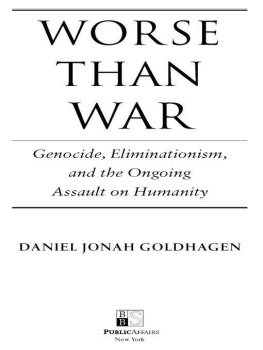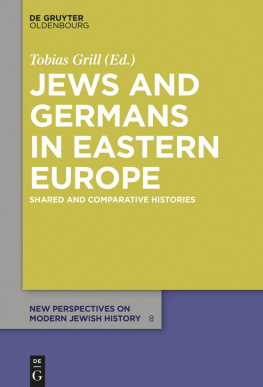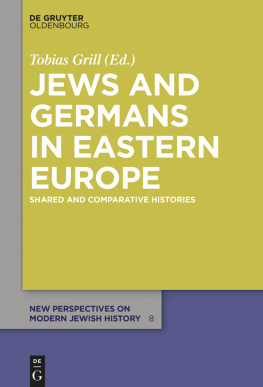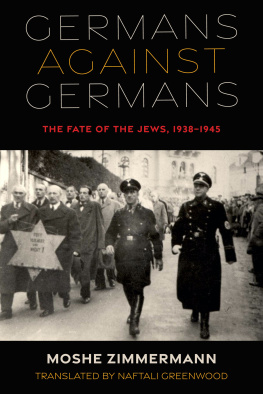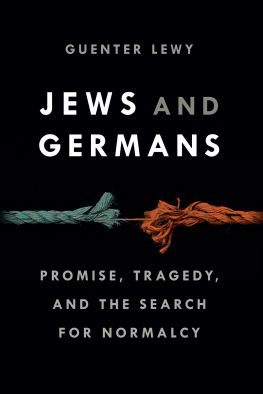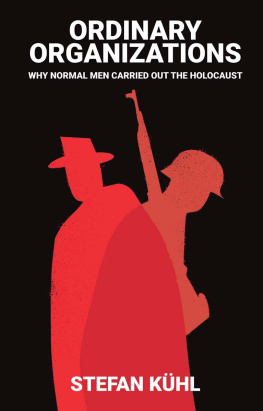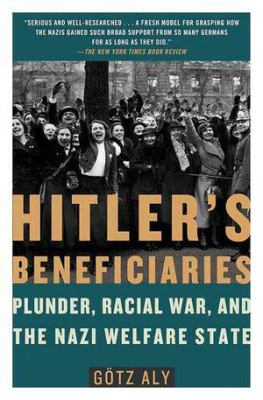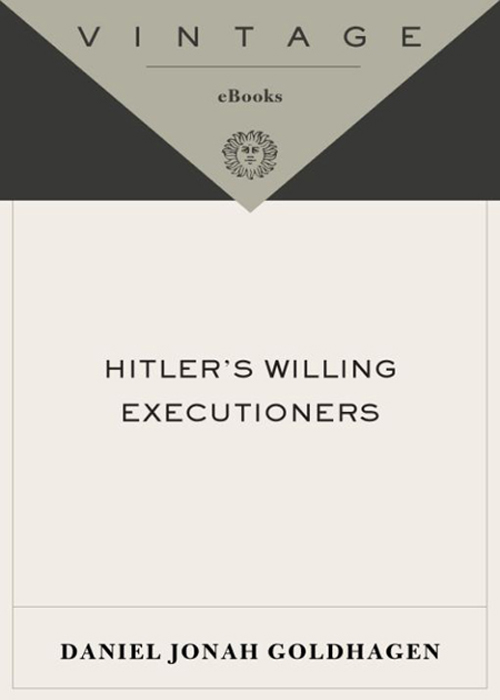
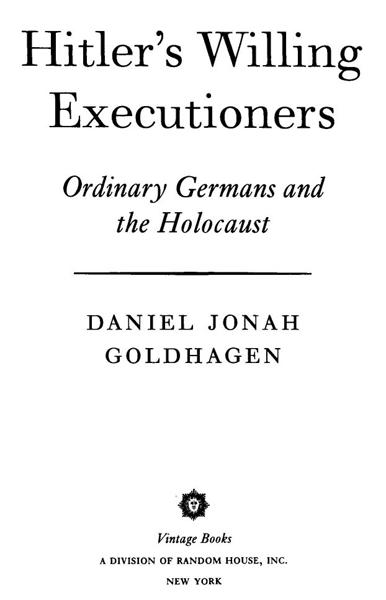
Table of Contents
To Erich Goldhagen,
my father and teacher
No man can struggle with advantage against the spirit of his age and country, and however powerful a man may be, it is hard for him to make his contemporaries share feelings and ideas which run counter to the general run of their hopes and desires.
ALEXIS DE TOCQUEVILLE
Democracy in America
National Acclaim for
DANIEL JONAH GOLDHAGEN'S Hitler's Willing Executioners
"This book is not easy for the heart to handle. But it tells what kind of people did the killing and how they could. That makes it very much of use to the living." The New York Times
"Overwhelming and devastating.... It will not be possible to write about the Holocaust without taking into account the findings of this extraordinary book." Foreign Affairs
"It will revolutionize Holocaust studies.... His chilling conclusion seems incontrovertible." San Francisco Chronicle
"It is rare for a book to say something stunningly new and powerful on a subject that some of the greatest minds of our and the last generation have struggled with. People will be reading Hitler's Willing Executioners for the next fifty years." James E. Scott, Yale University
"Powerfully marshals previously untouched records to shed brilliant new light on the killers.... The sheer power of Goldhagen's analysis and the weight of his evidence guarantee that this book is bound to shape all future discussions of the Holocaust." Detroit Free Press
"Daniel Goldhagen's astonishing, disturbing, and riveting book, the fruit of phenomenal scholarship and absolute integrity, will permanently change the debate on the Holocaust." Simon Schama
"Goldhagen has written a book of extraordinary power and importance that anyone concerned with the Holocaust must read." Dallas Morning News
"Daniel Goldhagen has produced what may well turn out to be the nonfiction book of the year." New York Post
"Hitler's Willing Executioners is a passionate work by an engaged scholar.... His narrative ... will force us to rethink the distinction between Nazis and 'ordinary Germans.' " Boston Globe
International Acclaim
Winner of the Democracy Prize
"A tremendous contribution to the understanding and teaching of the Holocaust.... Based on remarkable research, Goldhagen's indictment reveals troubling, perplexing truths." Elie Wiesel, The Observer (London)
"The book is a masterpiece, a must for anyone who wants to understand the persecution and extermination of the Jews in the Third Reich." Die Presse (Austria)
"Compels us to rethink our old conceptions.... Goldhagen's case studies of the perpetrators and their motives are more broadly based and more profoundly analyzed than any previous investigations." Die Zeit (Germany)
"If you read only one non-fiction work this year, make sure it's this one." The Gazette (Montreal, Canada)
"Daniel Jonah Goldhagen has written a brilliant book." Bltter fr Deutsche und Internationale Politik (Germany)
"A monumental achievement.... The force and strength of Goldhagen's polemic is pulverizing." The Sunday Times (London)
"The most spectacular nonfiction success of this year." Frankfurter Allgemeine Zeitung (Germany)
"It raises anew in an unequivocal manner central questions which had, intentionally or unintentionally, been pushed aside or were glossed over by the main body of Holocaust scholarship." Ha'arets (Israel)
"One of the most important books ever written about the Holocaust." Humo (Belgium)
Introduction
RECONCEIVING CENTRAL ASPECTS OF THE HOLOCAUST
CAPTAIN WOLFGANG HOFFMANN was a zealous executioner of Jews. As the commander of one of the three companies of Police Battalion 101, he and his fellow officers led their men, who were not SS men but ordinary Germans, in the deportation and gruesome slaughter in Poland of tens of thousands of Jewish men, women, and children. Yet this same man, in the midst of his genocidal activities, once stridently disobeyed a superior order that he deemed morally objectionable.
The order commanded that members of his company sign a declaration that had been sent to them. Hoffmann began his written refusal by saying that upon reading it, he had thought that an error had been made, "because it appeared to me a piece of impertinence to demand of a decent German soldier to sign a declaration in which he obligates himself not to steal, not to plunder, and not to buy without paying...." He continued by describing how unnecessary such a demand was, since his men, of proper ideological conviction, were fully aware that such activities were punishable offenses. He also pronounced to his superiors his judgment of his men's character and actions, including, presumably, their slaughtering of Jews. He wrote that his men's adherence to German norms of morality and conduct "derives from their own free will and is not caused by a craving for advantages or fear of punishment." Hoffmann then declared defiantly: ''As an officer I regret, however, that I must set my view against that of the battalion commander and am not able to carry out the order, since I feel injured in my sense of honor. I must decline to sign a general declaration."1
Hoffmann's letter is astonishing and instructive for a number of reasons. Here is an officer who had already led his men in the genocidal slaughter of tens of thousands of Jews, yet who deemed it an effrontery that anyone might suppose that he and his men would steal food from Poles! The genocidal killer's honor was wounded, and wounded doubly, for he was both a soldier and a German. His conception of the obligations that Germans owed the "subhuman" Poles must have been immeasurably greater than those owed Jews. Hoffmann also understood his parent institution to be so tolerant that he was willing to refuse a direct order and even to record his brazen insubordination in writing. His judgment of his mena judgment based, no doubt, on the compass of their activities, including their genocidal oneswas that they acted not out of fear of punishment, but with willing assent; they acted from conviction, according to their inner beliefs.
Hoffmann's written refusal sets in sharp relief important, neglected aspects of the Holocaustsuch as the laxness of many of the institutions of killing, the capacity of the perpetrators to refuse orders (even orders to kill), and, not least of all, their moral autonomyand provides insight into the unusual mind-set of the perpetrators, including their motivation for killing. It should force us to ask long-ignored questions about the sort of worldview and the institutional context that could produce such a letter which, though on a tangential subject and seemingly bizarre, reveals a host of typical features of the Germans' perpetration of the Holocaust. Understanding the actions and mind-set of the tens of thousands of ordinary Germans who, like Captain Hoffmann, became genocidal killers is the subject of this book.
DURING THE HOLOCAUST, Germans extinguished the lives of six million Jews and, had Germany not been defeated, would have annihilated millions more. The Holocaust was also the defining feature of German politics and political culture during the Nazi period, the most shocking event of the twentieth century, and the most difficult event to understand in all of German history. The Germans' persecution of the Jews culminating in the Holocaust is thus the central feature of Germany during the Nazi period. It is so not because we are retrospectively shocked by the most shocking event of the century, but because of what it meant to Germans at the time and why so many of them contributed to it. It marked their departure from the community of "civilized peoples.''2 This departure needs to be explained.
Next page

